More Videos from Tictionary
Posted on: November 26, 2008
While many of the videos uploaded on Youtube make fun of Tourette Syndrome and are meant for laughter, there are several videos on Youtube that genuinely attempt to answer commonly asked questions on Tourette Syndrome. Here are 2 of them, uploaded by Tictionary, a TS individual with OCD from UK, who has uploaded many videos that has helped many people around the world to understand the true nature of tics.
1. “Why some tics can be held back while others can’t”
Some people have asked me why some tics can be held back while others can’t. Here is an explanation of the degree to which tics are involuntary. It also explains why some people say their tics are completely involuntary and uncontrollable while other people say they are more like compulsions and that they can hide them.
When I talk about the involuntary sensations, these are what are known as ‘sensory tics’ and ‘premonitory urges’.
2. “Tics and compulsions: The big difference”
Many people think that tics and compulsions are on different ends on the same spectrum. Although they are connected in some ways and people with either Tourette syndrome or obsessive compulsive disorder will often have traits of the other, tics and compulsions are different in that they are responses to different things.
I also talk, in the second half, about the compulsion spectrum and obsessive compulsive disorder, although I haven’t given this much thought and don’t know as much about it as the tic spectrum.
Watch more of Tictionary’s videos on Youtube here. Please note that the videos uploaded by Tictionary are meant for education purposes only and belong to Tictionary. In the videos, she also speaks based on her own personal experience and not on any scentific or medical findings, hence viewer discretion is advised.
Even though Tourette Syndrome is said to affect 1% of the population, most Singaporeans still do not know what Tourette Syndrome is.
The Fall 2008 issue of Tourette Syndrome Association (America)’s
award-winning children’s newsletter is published and now available online on TSA website.
“That Darn Tic” newsletter is a collection of stories, poems, cartoons, riddles and jokes submitted by kids with Tourette Syndrome.
School Talks on Tourette Syndrome held at Chung Cheng High School(Main) on 17th October 2008 & at Raffles Girls’ School on 24th October 2008
Posted on: November 5, 2008
As part of our efforts to promote awareness of Tourette Syndrome in Singapore among the young population, our team conducted a talk on Tourette syndrome at Chung Cheng High School (Main) on 17th Oct 2008 as part of the students’ post exam activities.

Summary of Pictures for CCHS Talk
It was a pleasant experience with the students, who mostly had not heard of Tourette Syndrome before.
Through our talk, we shared some of the symptoms, causes and treatments of Tourette Syndrome.
In addition, we showed some videos of Tourette Syndrome individuals sharing their feelings and thoughts. This enhanced the students’ understanding of Tourette Syndrome and how it has affected the lives of Tourette Syndrome individuals.
To allow the students to be able to relate to Tourette Syndrome individuals, we conducted a Tic Stimulation with them. This Tic Stimulation serves to let have a rough idea of how it feels like to have Tourette Syndrome – how distracting the tics can be while they are trying to concentrate on a task.
During the talk, we also informed the students about the Tourette Syndrome Care Group Singapore which have already been around for 6 years to assist TS individuals, their families and caregivers.
Finally we ended with a Question and Answer session to see of the students had a greater insight of Tourette Syndrome.
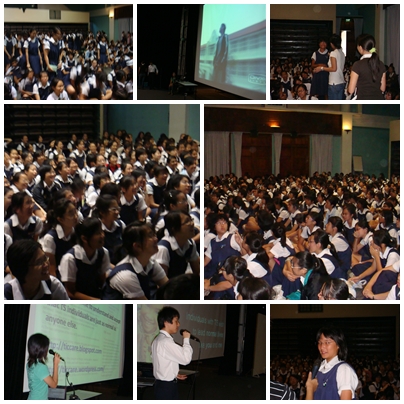
Summary of Pictures for RGS Talk
Subsequently we also organized a second session of our talk at Raffles Girls School on 24th October 2008. During both of these talks, prizes sponsored by Golden Village was given to students who participated in the Tic Simulation and Q&A session.
More pictures of the 2 school talks to follow:
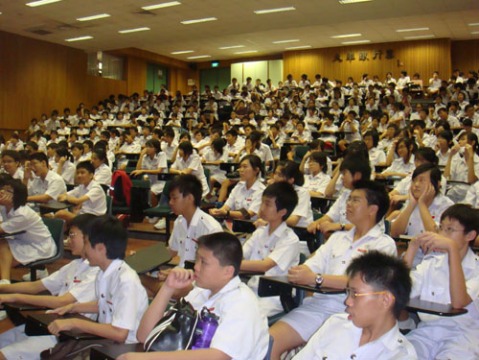
Our audience of Secondary 2 CCHS students
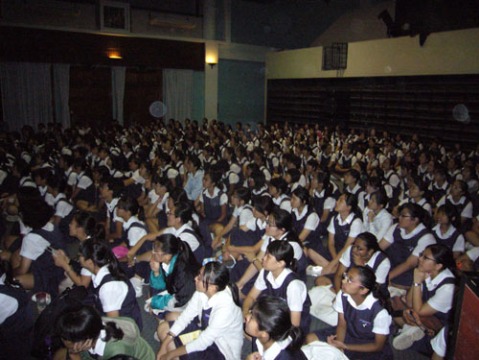
Our audience of sec 3 RGS students
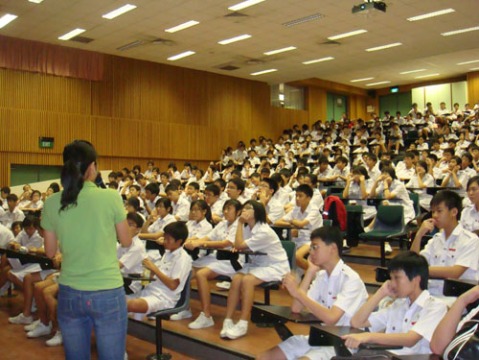
One of our speakers speaking to the crowd at CCHS on Tourette Syndrome's symptoms and behaviour

Beginning our Tic Simulation to engage the entire audience

Educating the RGS audience of the stress felt by children or teens with TS during exams or studying through Tic Simulation
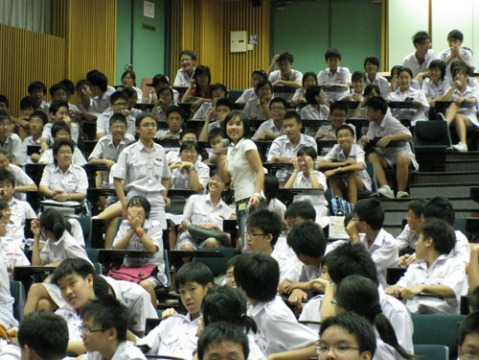
The CCHS audience getting involved during the Tic Simulation

Participant of Q&A session answering a question

Prizes for Q&A and Tic Simulation experiment include movie posters, colour pencils and other movie merchandise sponsored by Golden Village.
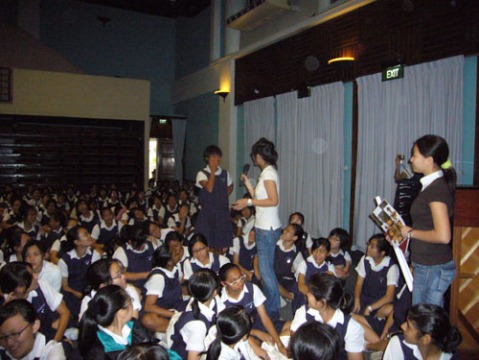
One of the RGS girl taking part in Tic Simulation with prizes waiting to be won
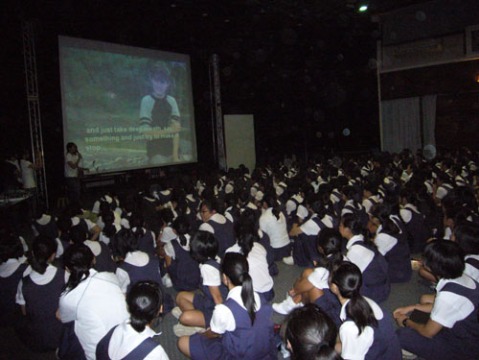
The audience watching one of the videos on the lives of children with Tourette Syndrome

CCHS audience watching an video of how a local TS individual was treated during his school life
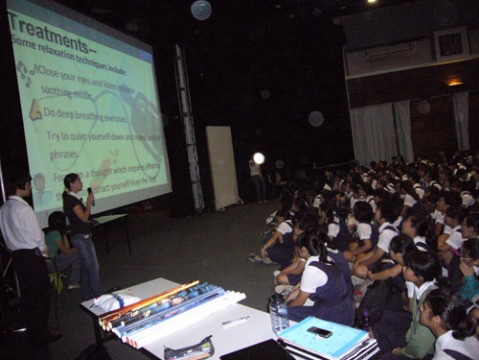
Educating the audience of the relaxation techniques useful for individuals with Tourette Syndrome

Reminding our young audience of the need to be understanding

RGS students listening attentively

Introducing Tourette Syndrome Care Group Singapore to the audience and its website

Elaborating on the Tourette Syndrome Care Group Singapore and revenues of seeking help for TS indviduals
Lastly, we would like express our gratitude to everyone including our generous sponsors Golden Village, RGS and CCHS for making these 2 events possible.
Taken from asiaonehealth:
Tourette Syndrome is named after the French doctor Georges Gilles de la Tourette, who first described the condition in 1885.
Doctors still do not know what exactly causes the condition but they do know that 10 to 15 per cent of patients may have a family history of Tourette Syndrome.
There are no figures for the number of Tourette Syndrome patients in Singapore.
Dr Au Wing Lok, consultant neurologist at the National Neuroscience Institute, Singapore, said that recent evidence suggests a neurochemical basis for the disorder.
In particular, the neurotransmission in the areas involved in motor, emotional and behavioural control are affected.
The main symptoms are motor tics, which are sudden, apparently uncontrollable movements, and vocal tics, which are involuntary vocalisations.
Examples of tics include exaggerated blinking of the eyes, touching a body part or person repeatedly, throat clearing,repeating others’ words or involuntary cursing.
When the patient is under duress, the tics may become more severe or frequent or may change entirely.
There is no cure for Tourette Syndrome but symptoms may be controlled through medication.
Dr Au added that the support of families and friends of Tourette Syndrome patients helps them to cope with the disorder better.
Tourette Syndrome is named after the French doctor Georges Gilles de la Tourette, who first described the condition in 1885.
Doctors still do not know what exactly causes the condition but they do know that 10 to 15 per cent of patients may have a family history of Tourette Syndrome.
There are no figures for the number of Tourette Syndrome patients in Singapore.
Dr Au Wing Lok, consultant neurologist at the National Neuroscience Institute, Singapore, said that recent evidence suggests a neurochemical basis for the disorder.
In particular, the neurotransmission in the areas involved in motor, emotional and behavioural control are affected.
The main symptoms are motor tics, which are sudden, apparently uncontrollable movements, and vocal tics, which are involuntary vocalisations.
Examples of tics include exaggerated blinking of the eyes, touching a body part or person repeatedly, throat clearing,repeating others’ words or involuntary cursing.
When the patient is under duress, the tics may become more severe or frequent or may change entirely.
There is no cure for Tourette Syndrome but symptoms may be controlled through medication.
Dr Au added that the support of families and friends of Tourette Syndrome patients helps them to cope with the disorder better.
For more information on Tourette Syndrome, log on to The Singapore TS Care Group’s website at http://sg. geocities.com/ticscare/
This article was first published in Mind Your Body, The Straits Times on September 04, 2008.
As part of Institute of Mental Health’s 80th anniversary and in conjunction with the 5th Congress of the Asian Society For Child and Adolescent Psychiatry and Allied Profession(ASCAPAP), the Tourette Syndrome Care Group Singapore organised Understanding Tourette Syndrome Public Forum on 30th August 2008 at Suntec City meeting rooms 303-305.
The aim of this forum was to raise awareness for about Tourette Syndrome (TS) through multi-talented presentations by sufferers, caregivers/parents, teachers, psychologists and psychiatrists.
During this forum, the audience of this forum was given a short introduction to Tourette Syndrome and learned that Obsessive Compulsive Disorder (OCD) and Attention Deficit Disorder (ADD) can accompany Tourette Syndrome.
Next, school teachers, parents and caregivers picked up tips on how to handle children with Tourette Syndrome, such as introducing a gluten-free diet which might decrease the frequency of symptoms in certain individuals. Sufferers who shared their personal experiences in coping with Tourette Syndrome gave the audience inspirational insights on living positively with the message “You have Tourettes but Tourette doesn’t have you.”
Lastly, an Q & A session gave several audience the chance to clear their doubts on Tourette Syndrome together with a panel of experts. The entire forum, lasting 2 hours, proved to be a great information session for those who would like to find out more about Tourette Syndrome. Although this forum was held concurrently with the Comex PC show which congested the entire Suntec City Convention Hall, that did not stop parents, caregivers and sufferers from attending what proved to be another successful event organised by TSCGS.






Recent Comments